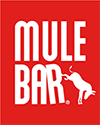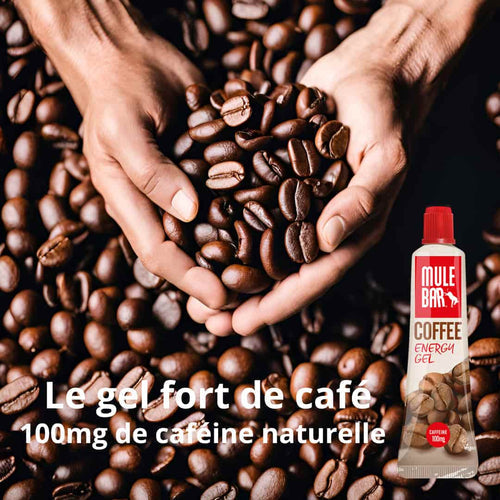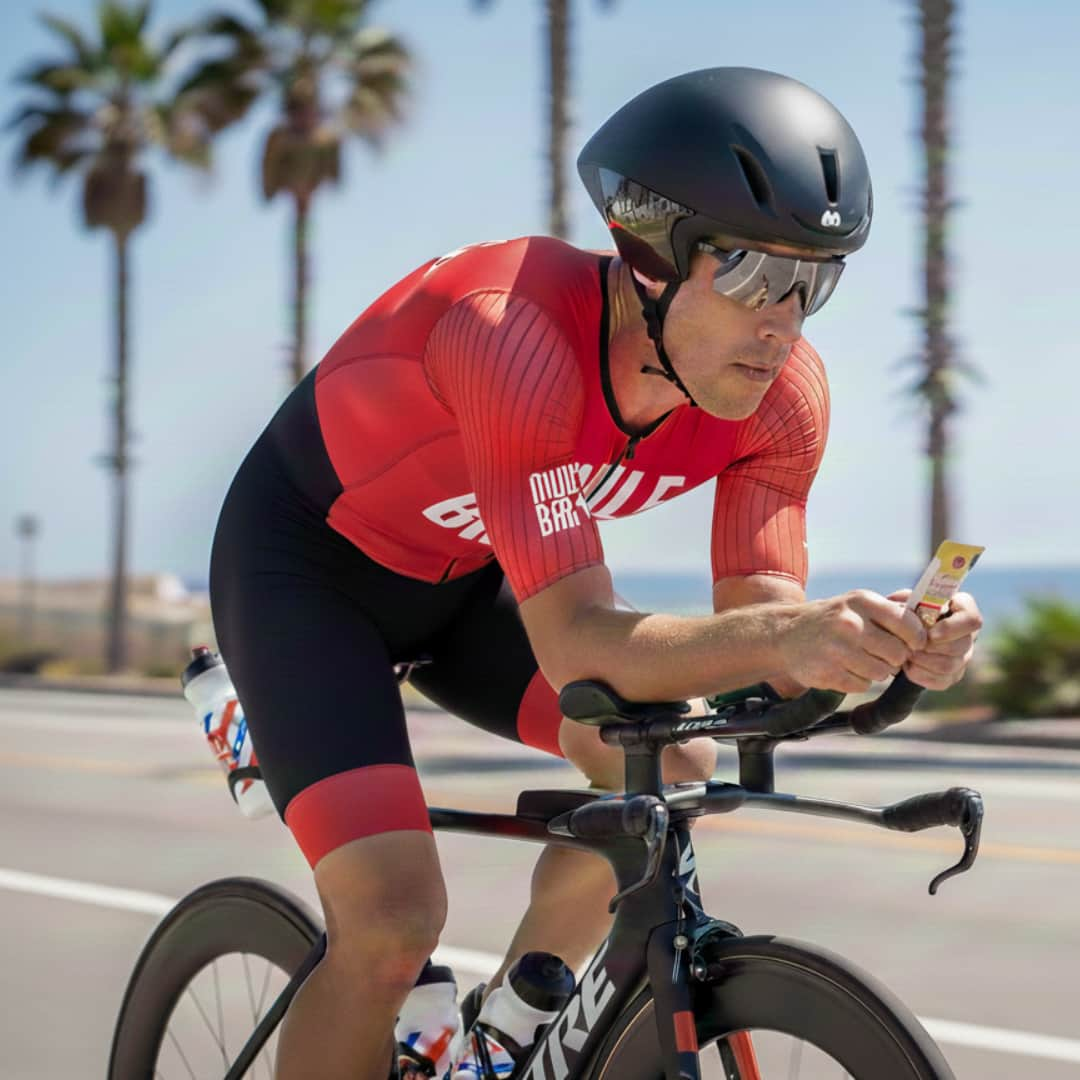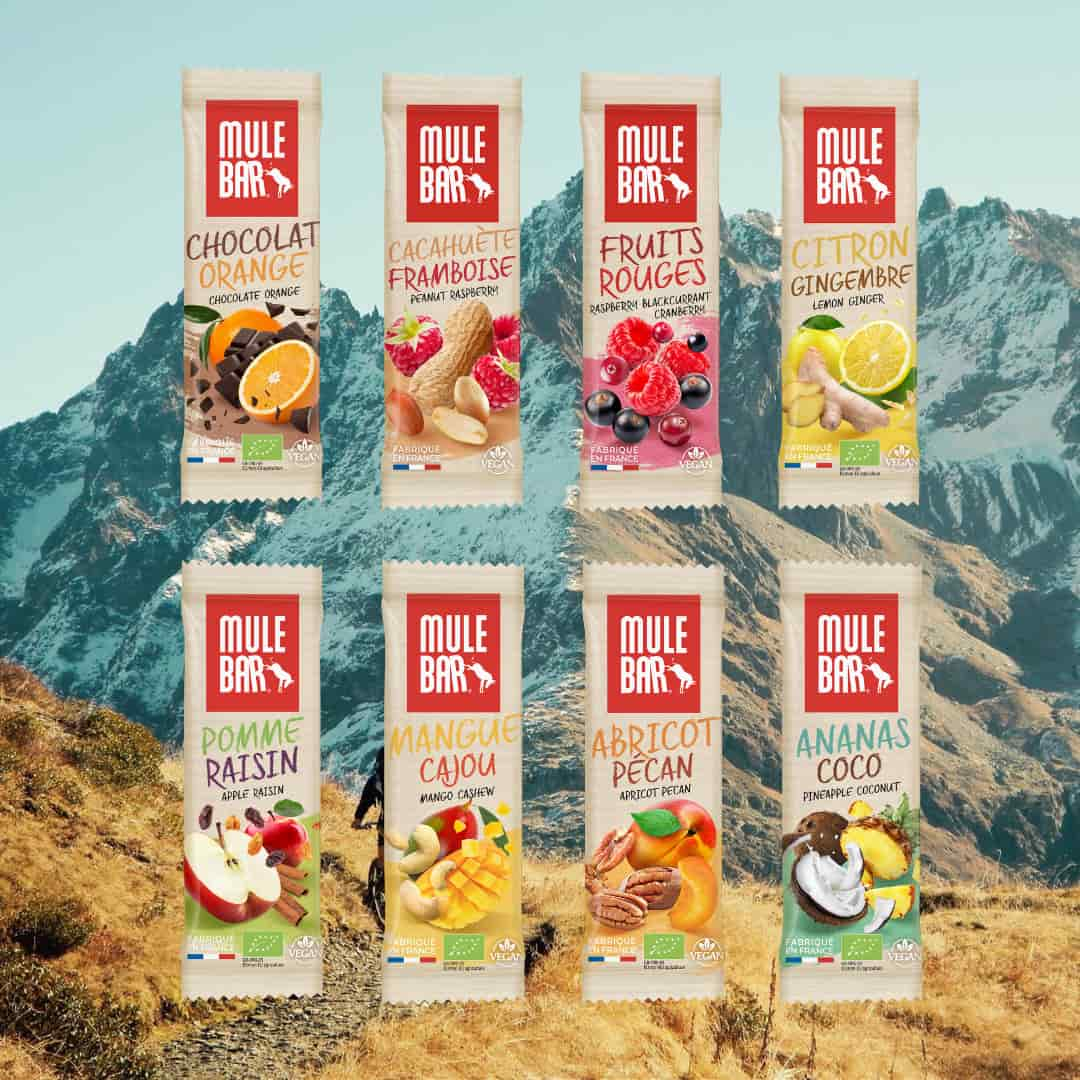Caffeine has long been known to have stimulant properties. Discovered in the early 19th century as a chemical compound found in coffee, it acts as a psychotropic stimulant. It is found in many plants and is sometimes called theine, guaranine or mateine, depending on its origin. In small doses, caffeine can be beneficial for athletes. No matter what sport you play, you can safely consume amounts of caffeine. However, excessive consumption can lead to serious health problems.
Let's review the pros and cons of caffeine when used to improve athletic performance in running or training. Let's see what are the benefits of caffeinated gels for sports.
What is caffeine?
Caffeine is an alkaloid found in coffee, tea, chocolate, and some flavorings and extracts, including: cola, guarana, yerba mate. Caffeine is not generally synthesized because it is already available in large quantities as a by-product of decaffeination. However, it can be synthesized from dimethylurea and malonic acid. This synthetic (unnatural) caffeine found in colas and energy drinks is not recommended.
The effects of caffeine on the body
It has a stimulating effect on the central nervous system by acting on neurotransmitters, which accelerates nervous activity and facilitates the release of adrenaline into the blood. This release of hormones accelerates the heart rate, hence the contraindication for people with heart problems or sensitive people. Studies have shown that caffeine can increase attention, improve cognitive functions and have beneficial effects on health. For athletes, caffeine consumption can increase concentration, alertness and delay the feeling of fatigue, which can improve sports performance. Improvements have been observed in runners, cyclists and in endurance sports, as well as in short and intense efforts such as a sprint in cycling, the last few hundred meters of a marathon. Identical effects have been observed during short, intense and repeated efforts such as in ball sports or team sports such as basketball, handball, football or rugby.
To achieve these effects, it is necessary to absorb between 2 and 5 mg of caffeine per kilogram of body weight. For a man weighing 80 kg, this corresponds to a dosage varying from 160 to 400 mg. However, studies show that an athlete will already feel positive effects at doses of 50 to 100 mg. The ideal dosage will however vary greatly from one person to another, in particular according to the level of habituation to caffeine, their corpulence, the intensity of the effort and genetic differences.
According to the European Food Safety Authority ( EFSA ), the recommended amount of caffeine per day should not exceed 400mg for a healthy adult man, or around 7 to 8 espressos! For women, the limit is rather 300mg per day, or between 5 and 6 espressos. It is of course not recommended for people with heart conditions, pregnant women and children. The law requires all products containing caffeine to display this on their packaging.
What foods contain caffeine?
- A 100g bar of 100% cocoa dark chocolate for baking contains 240mg of caffeine.
- A 150ml cup of espresso coffee contains 80mg on average because the type of coffee used and the method of preparation can vary the content enormously.
- A 250ml cup of green tea contains 40mg while black tea reaches 70mg. Herbal tea does not contain any.
- A 250ml can of Redbull contains 80mg while a 250ml glass of Coca-Cola contains only 24mg.
- Yerba mate - a traditional drink of the Guarani Amerindians - is said to be a natural alternative to coffee. The leaves of Ilex paraguariensis contain on average 1% caffeine, less than coffee, but more than tea.
- Guarana, a South American plant whose fruits resemble coffee beans, is popular for its caffeine content, Guaranine. Its consumption is generally done via capsules or powders integrated as an ingredient in recipes for food supplements, chewing gum.
- Athletes generally consume caffeine in their energy gels which can contain between 25mg and 100mg per tube of 30g to 50g depending on the brand.
Table of foods containing the most caffeine :

Benefits of caffeine in sports nutrition:
Caffeine has long been on the list of doping products. However, since 2004, this is no longer the case. This is a decision of the World Anti-Doping Agency (WADA). However, the monitoring and control of athletes remains very present. The threshold set by the World Anti-Doping Agency (WADA) is 12mg/ml. This is equivalent to drinking 4 large coffees in less than 2 hours.
- Improved physical performance: According to research results from a group of kinesiology researchers at the University of Georgia in the United States, caffeine may be able to increase athletic performance by increasing the ability of muscles to contract.
- Increased concentration and alertness. This is crucial at the start and during any sporting activity. For example, it can be seen on the faces of athletes at the start of a sprint race. Caffeine can help athletes because it promotes the release of excitatory neurotransmitters. This positively influences memory for a short period of time. Caffeine allows the athlete to concentrate and be attentive. It is also very popular with tennis and golf players.
- Increased Metabolism and Fat Burning : Caffeine can boost metabolism, which promotes fat burning and aids in weight loss. Research has shown that athletes who drink coffee before their workout burn up to 15% more calories than those who don’t. The effect continues for several hours after exercise. It also acts as an appetite suppressant, which is very useful for athletes looking to control their weight, such as in martial arts or combat sports.
- Reduced fatigue and improved endurance : Caffeine can improve endurance by delaying fatigue. This reduces the perception of effort and can allow athletes to maintain high levels of effort for longer periods; a plus for endurance sports. Caffeinated products are essential for races that last several days, such as ultra trail running (UTMB, Grand Raid de la Réunion, etc.), where athletes spend one or two nights outside without sleeping or sleeping very little.
- Improved breathing . Caffeine is said to have a bronchodilator effect, meaning it makes breathing easier, particularly in asthmatics.
- Positive effect on intestinal transit . Caffeine fights constipation by promoting perfect digestion. This is therefore excellent news for athletes who enjoy endurance races such as trail running, marathons or cyclosportives.
- It also acts as a painkiller by alleviating headaches or migraines . It can be consumed in addition to paracetamol, respecting the doses prescribed by your doctor.
Focus on Mulebar caffeinated gels
The Mulebar energy gel range has 5 flavors, two of which are caffeinated. Their very fluid texture allows for rapid assimilation by the body and an effect within 5 to 10 minutes of absorption. All are available in 37g tubes and 444g gel eco-refill bottle, the equivalent of 12 tubes.
Mulebar lemon-ginger-guarana energy gel


With 50mg of caffeine from natural Guarana, this 37g Lemon energy gel is in the upper average of the market. It is used in the middle of the race, for example around the 20th kilometer of a marathon or before climbing a pass by bike.
It is recommended to consume it in 2 or 3 times with a little water to remove the sugar from the mouth. It's a good thing the tube cap is really easy to reseal, it's the only one on the market!
Ingredients :
Agave syrup, brown rice syrup, lemon juice concentrate, natural guarana extract, Himalayan pink salt crystals, natural ginger flavor.
- Brown rice syrup with its high glycemic index provides the immediate energy sought in a gel.
- Agave syrup provides natural fructose with its low glycemic index (15)
- Lemon juice concentrate provides freshness without acidity
- Ginger extracts contribute to a normal immune system
- Guarana contributes to fat metabolism
- Himalayan pink salt is very rich in trace elements, especially iron, which allows good blood regeneration and improves circulation. It helps to have healthy lungs and improve respiratory functions. It helps to restore blood pH (acid-base balance). It acts on gastric reflux problems.
Nutritional values :
| 100g | Gel 37g | |
| Energy kJ | 1266 | 468 |
| Energy kCal | 303 | 112 |
| Fat (g) | 0.2 | 0 |
| Of which saturated fatty acids (g) | 0 | 0 |
| Carbohydrates (g) | 75 | 28 |
| Of which sugars (g) | 68 | 25 |
| Dietary fiber (g) | 1 | 0 |
| Protein (g) | 0.5 | 0.2 |
| Salt (g) | 0.6 | 0.2 |
| Caffeine (mg) | 135 | 50 |
Mulebar Coffee Energy Gel


With 100mg of caffeine from coffee concentrate and natural Guarana, this is the most caffeinated energy gel on the market. A real kick from the mule to propel you to the finish line. It is perfect for night races, you are sure not to sleep at night! It will delight coffee-loving "gringos" because its taste is really powerful so much so that you can hardly feel the sugar it contains.
Mulebar gel tubes are reusable after rinsing with hot water by filling them with their eco-refill bottles.
Ingredients :
Brown rice syrup, malted barley syrup, agave syrup, coffee concentrate, natural guarana extract, Himalayan pink salt crystals.
For allergens see ingredients in bold
- Brown rice syrup and malted barley syrup with their high glycemic indexes provide the immediate energy sought in a gel.
- Agave syrup provides natural fructose with its low glycemic index (15)
- Coffee and Guarana provide natural caffeine (100mg per gel) for less fatigue during exercise and many benefits.
- Himalayan pink salt is very rich in trace elements, especially iron, which allows good blood regeneration and improves circulation. It helps to have healthy lungs and improve respiratory functions. It helps to restore blood pH (acid-base balance). It acts on gastric reflux problems.
Nutritional values :
| 100g | Gel 37g | |
| Energy kJ | 1268 | 469 |
| Energy kCal | 303 | 112 |
| Fat (g) | 0.3 | 0 |
| Of which saturated fatty acids (g) | 0 | 0 |
| Carbohydrates (g) | 74 | 27 |
| Of which sugars (g) | 59 | 22 |
| Dietary fiber (g) | 0 | 0 |
| Protein (g) | 1.5 | 0.6 |
| Salt (g) | 0.6 | 0.2 |
| Caffeine (mg) | 271 | 100 |
With all these qualities, one could almost believe that caffeine is a miracle product essential to any sporting activity. Be careful because not everything is so magical, it also has side effects on health, especially when large quantities are absorbed.
The disadvantages of misusing caffeine:
Regular consumption of caffeine leads to dependence and better tolerance. This means that a higher amount is needed to achieve the same effects. Excessive consumption of caffeine can lead to unwanted side effects such as:
- Sleep disorders, insomnia : Caffeine is a stimulant, which is why it is generally recommended not to consume it at the end of the day if you want to have restful, quality sleep.
- Anxiety, irritability: Studies have shown that caffeine may increase symptoms of anxiety in some people, particularly those who are predisposed to comorbid anxiety disorders such as generalized anxiety or panic disorders.
- Tremors, heart palpitations and high blood pressure : characterized by a persistent increase in blood pressure.
- Digestive problems ( increased diuresis, nausea or vomiting) linked to loss of magnesium and calcium and the secretion of acid in the stomach. This can even cause ulcers.
- Muscle cramps . Drinking plenty of water is also recommended to avoid the dehydrating effect that caffeine consumption can cause.
Conclusion
The use of caffeine in sports nutrition has undeniable benefits in terms of improving physical performance, increasing metabolism and endurance. However, it is essential to consider potential drawbacks such as dependence, tolerance and unwanted side effects. Consumed in doses recommended by sports nutritionists or doctors, caffeine has more benefits than side effects.




Leave a comment
This site is protected by hCaptcha and the hCaptcha Privacy Policy and Terms of Service apply.